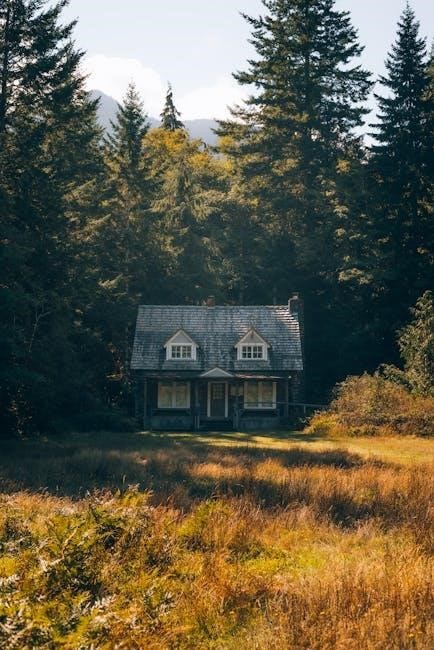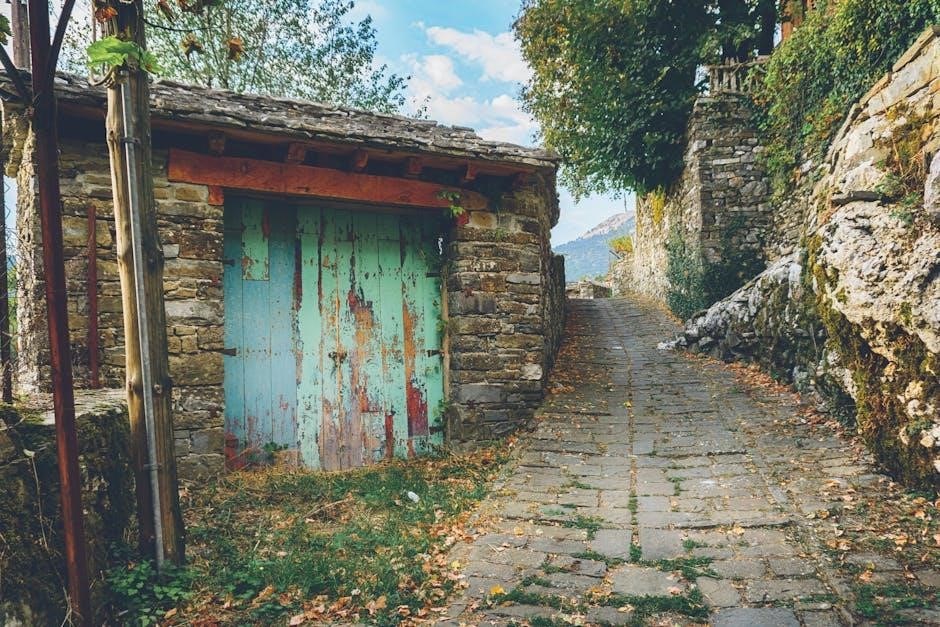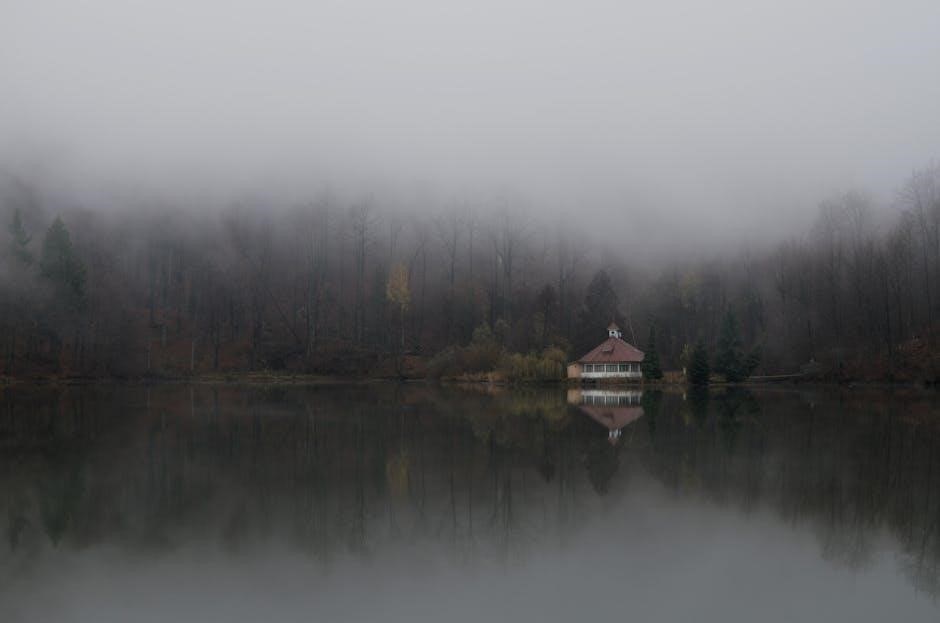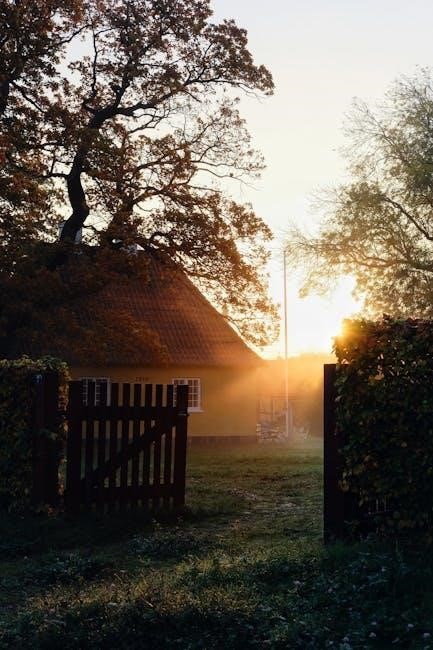Edgar Allan Poe’s Gothic tale explores decay, madness, and supernatural mystery. The story follows Roderick Usher and his sister Madeline in a crumbling mansion, symbolizing their psychological and familial collapse, blending eerie atmosphere with themes of isolation and death;
Background and Historical Context
Published in 1839, “The Fall of the House of Usher” is one of Edgar Allan Poe’s most iconic works, reflecting his mastery of Gothic literature. The story emerged during a period of heightened interest in supernatural and psychological themes in 19th-century America. Drawing inspiration from European Gothic traditions, Poe crafted a tale that explores madness, isolation, and the disintegration of a once-prominent family. The narrative’s eerie atmosphere and symbolic elements resonate with the cultural fascination of the time, solidifying its place in literary history.
Significance of the Story in Edgar Allan Poe’s Works
In Edgar Allan Poe’s oeuvre, “The Fall of the House of Usher” stands as a masterclass in Gothic storytelling and psychological depth. It showcases his ability to weave intricate narratives that explore themes of madness, death, and the supernatural. The story is pivotal in highlighting Poe’s fascination with the human psyche and his innovative use of symbolism. Its enduring popularity underscores its influence on later literary movements and cemented Poe’s reputation as a pioneer of dark, atmospheric fiction.
The Setting of the Story
The story unfolds in an ancient, decaying mansion, isolated in a desolate landscape during autumn, creating a hauntingly eerie atmosphere that mirrors the characters’ psychological states.
Description of the House of Usher
The House of Usher is an ancient, decaying mansion characterized by its gloomy, oppressive architecture. Its exterior appears to be in a state of advanced disrepair, with cracks in the walls and overgrown vegetation, symbolizing the decay of the Usher family. The house exudes a sense of impending collapse, both physically and metaphorically, creating an eerie and foreboding atmosphere that parallels the psychological state of its inhabitants, particularly Roderick Usher.
The Gothic Atmosphere and Its Impact on the Narrative
The story’s Gothic atmosphere is central to its haunting narrative, evoking a sense of dread and foreboding. The decaying mansion, with its dark, oppressive interiors and eerie sounds, mirrors the psychological turmoil of its inhabitants. Shadows, silence, and an overwhelming sense of decay create tension, drawing the narrator and reader into a world of madness and fear. This atmospheric setting amplifies the supernatural elements and themes of isolation, making the House of Usher a character in itself, driving the story’s tragic progression.

The Usher Family
The Usher family, shrouded in mystery, faces a dark legacy of decay and madness. Their isolated existence in the crumbling mansion reflects their intertwined physical and psychological downfall.
History and Background of the Usher Family
The Usher family, with an ancient lineage, has long been shrouded in mystery and a reputation for eccentricity. Their history is marked by a mysterious curse and unexplained misfortunes. The family’s isolation has fostered an aura of secrecy, contributing to their enigmatic status. Their once-noble name now carries whispers of decay and madness. The Usher family’s entwined fate with their crumbling mansion symbolizes their collective downfall, deeply rooted in their dark, untold history, which ultimately shapes the tragic events of the story.
Roderick Usher: Character Analysis
Roderick Usher, the last male heir of the ancient Usher family, is a complex and deeply troubled character. His fragile mental state, heightened sensitivity, and physical decline reflect the family’s curse. Roderick’s neurotic behavior and hyperesthesia make him acutely aware of his surroundings, amplifying the eerie atmosphere of the mansion. His obsession with the supernatural and his own impending doom underscores his paranoia. Despite his artistic inclinations, Roderick’s grip on reality falters, leading to his tragic downfall, mirroring the crumbling house that symbolizes his inner decay and the family’s fate.
The House as a Symbol
The House of Usher is an emblem of the family’s psyche, entwined with their fate. Its decay mirrors their internal rot, while its supernatural presence amplifies the madness.
The House as a Reflection of the Family’s Decline
The House of Usher serves as a poignant metaphor for the family’s downward spiral. Its crumbling structure and eerie atmosphere mirror the Usher family’s mental and physical deterioration. The once-grand mansion, now decaying and covered in moss, symbolizes the decay of the family’s legacy. The house’s strange architecture and supernatural elements reflect Roderick’s unstable psyche, while its isolation embodies the family’s disconnection from the outside world. The house’s fate is inextricably tied to the family’s, as both teeter on the brink of collapse, symbolizing the inevitability of their shared demise.
The House of Usher is described as a tall, gloomy structure with turrets and crumbling stone walls, creating an eerie and foreboding atmosphere. Its architecture seems to defy logic, with strange angles and irregular shapes that contribute to its unsettling presence. Supernatural elements, such as unexplained noises, movements, and an overall sense of dread, permeate the house. The building appears alive, reflecting the decay and madness of its inhabitants. Its unique design and haunting ambiance intensify the psychological tension, making it a central character in the story.
The Role of Madeline Usher
Architectural and Supernatural Elements of the House
The House of Usher is a decaying, ancient mansion with strange architectural features, such as turrets and crumbling walls, creating an eerie atmosphere. Supernatural occurrences, like unexplained noises and movements, suggest the house is alive. Its design, with irregular shapes and gloomy interiors, reflects the madness and decay of its inhabitants. The house becomes a character itself, embodying the psychological turmoil of Roderick and Madeline, amplifying the story’s Gothic horror and sense of impending doom.
Madeline’s Illness and Her Role in the Story
Madeline Usher suffers from a mysterious, debilitating illness that contributes to the eerie atmosphere. Her condition worsens, and her eventual death is a pivotal moment, reinforcing Roderick’s instability. Her entombment within the house and her later reappearance as a ghostly figure symbolize the inescapable fate of the Usher family. Her illness and death drive the narrative’s dark, supernatural events, making her a central figure in the story’s descent into madness and despair, ultimately sealing the family’s tragic destiny.
Madeline’s Death and Its Impact on Roderick
Madeline’s death exacerbates Roderick Usher’s psychological unraveling. Following her entombment, Roderick becomes consumed by grief and guilt, his mental instability worsening; The supernatural elements of her apparent return from the dead further shatter his fragile mind, amplifying his paranoia and despair. Her death symbolizes the irreversible decline of the Usher family, pushing Roderick toward complete madness and sealing the tragic fate of both the family and their crumbling house, intensifying the story’s dark and haunting climax.

The Narrator’s Perspective
The narrator, a childhood friend of Roderick Usher, visits the decaying mansion, feeling unease and curiosity. His observations of the eerie house and its inhabitants reveal growing tension and fear.
The Narrator’s Relationship with Roderick Usher
The narrator and Roderick Usher share a deep, albeit strained, bond, rooted in their childhood friendship. The narrator visits Roderick at his request, concerned by his friend’s deteriorating mental and physical state. Roderick’s plea for companionship highlights his isolation, while the narrator’s curiosity drives him to uncover the mysteries of the Usher household. Their interactions reveal a mix of empathy and unease, as the narrator struggles to understand Roderick’s madness and the eerie environment surrounding them. Their relationship underscores the story’s themes of decay and psychological turmoil.
The Narrator’s Perception of the House and Its Inhabitants
The narrator is immediately struck by the eerie, decaying appearance of the House of Usher, which evokes a sense of gloom and fear. Upon meeting Roderick, he notices his friend’s fragile mental state and unsettling behavior. The narrator also perceives Madeline as ill and enigmatic, adding to the mysterious atmosphere. His observations of the house’s crumbling structure and the strange, almost supernatural occurrences heighten his unease. The narrator’s perception of the house and its inhabitants gradually shifts from curiosity to dread, reflecting the story’s dark, Gothic undertones.

Themes in “The Fall of the House of Usher”
Themes include mental illness, death, isolation, and the supernatural, reflecting the decay of the Usher family and their haunted existence in a crumbling mansion environment.
Mental Illness and Madness
Mental illness is central to the story, with Roderick Usher exhibiting paranoia and hypersensitivity. His deteriorating mental state mirrors the crumbling house, symbolizing the fragility of his mind. Madeline’s mysterious illness adds to the eerie atmosphere, suggesting a familial curse. The collapse of their mental health drives the plot, leading to tragic consequences. Poe masterfully portrays madness as both a psychological and supernatural force, intertwining it with the decaying family legacy.
Death and the Supernatural
Death and the supernatural are pervasive in the story, with Madeline’s mysterious illness and eventual death driving the plot. Her entombment within the house and subsequent return create a chilling supernatural climax. Roderick’s fear of death and the supernatural, along with the eerie atmosphere, heightens the sense of impending doom. The story masterfully blends psychological horror with supernatural elements, leaving the narrator and readers questioning reality. Poe’s use of death and the supernatural underscores the Usher family’s tragic and inescapable fate.
Isolation and the Collapse of the Family
The Usher family’s isolation in their decaying mansion mirrors their emotional and psychological disconnection. Roderick and Madeline, the last of their line, are trapped by their dark family history and fear of the outside world. Their reclusive existence accelerates their mental and physical decline, as they become prisoners of their own fears and the crumbling house. The narrator’s visit highlights their detachment, as Roderick’s desperation for companionship contrasts with the oppressive solitude of their home.
Their isolation ultimately leads to the family’s collapse, as the house itself seems to embody their collective despair. The entombment of Madeline and Roderick’s subsequent unraveling symbolize the devastating consequences of their isolation. The story underscores how isolation can destroy even the strongest familial bonds, leaving only ruin in its wake.

Symbolism and Imagery
The decaying House of Usher symbolizes the family’s psychological and moral rot, while its eerie atmosphere reflects their dark destiny. Poe’s vivid imagery of crumbling walls, dark corridors, and the oppressive landscape heightens the sense of dread, foreshadowing the inevitable collapse of both the house and its inhabitants, embodying themes of decay, madness, and mortality.
The Use of Darkness and Light in the Story
Poe masterfully employs darkness and light to evoke psychological tension and foreshadow the narrative’s grim outcome. The oppressive, shadowy atmosphere of the Usher mansion symbolizes the characters’ mental decay and isolation. Darkness dominates, reflecting Roderick’s spiraling madness and the house’s eerie supernatural presence. Conversely, fleeting moments of light, such as the moon’s faint glow, offer brief, deceptive hope before plunging the story back into despair. This contrast underscores the inescapable descent into chaos and tragedy, heightening the tale’s haunting and macabre undertones.
The Significance of the Crumbling House
The crumbling House of Usher serves as a central symbol, reflecting the decay of its inhabitants and their dark, intertwined fate. Its cracked walls and decaying architecture mirror Roderick’s mental instability and the family’s historical decline. The house is both a physical structure and a living entity, exuding a supernatural presence that entombs its occupants. Its isolation and entrapment of the Ushers emphasize their inescapable doom, while its eventual collapse signifies the irreversible end of their lineage and the triumph of madness and death over reality.
The collapse of the House of Usher symbolizes the destruction of its inhabitants and their dark legacy. The story masterfully blends madness, death, and supernatural elements, leaving a lasting impact as a Gothic masterpiece.
The narrator visits Roderick Usher, an old friend, at his decaying mansion. Roderick suffers from mental and physical illness, while his sister Madeline appears near death. After Madeline’s apparent demise, Roderick entombs her in the house. Strange noises and Roderick’s escalating madness culminate in the house’s collapse, symbolizing the family’s downfall. Themes of isolation, mental illness, and the supernatural dominate, creating a haunting exploration of human psychology and mortality.
The Enduring Legacy of the Story
‘The Fall of the House of Usher’ remains a cornerstone of Gothic literature, its haunting themes of madness, decay, and the supernatural continuing to captivate readers. Poe’s masterful use of atmosphere and symbolism has influenced countless writers and adaptations, cementing its place in literary history. The story’s exploration of psychological complexity and familial collapse resonates deeply, ensuring its relevance across generations as a timeless tale of horror and human frailty.

